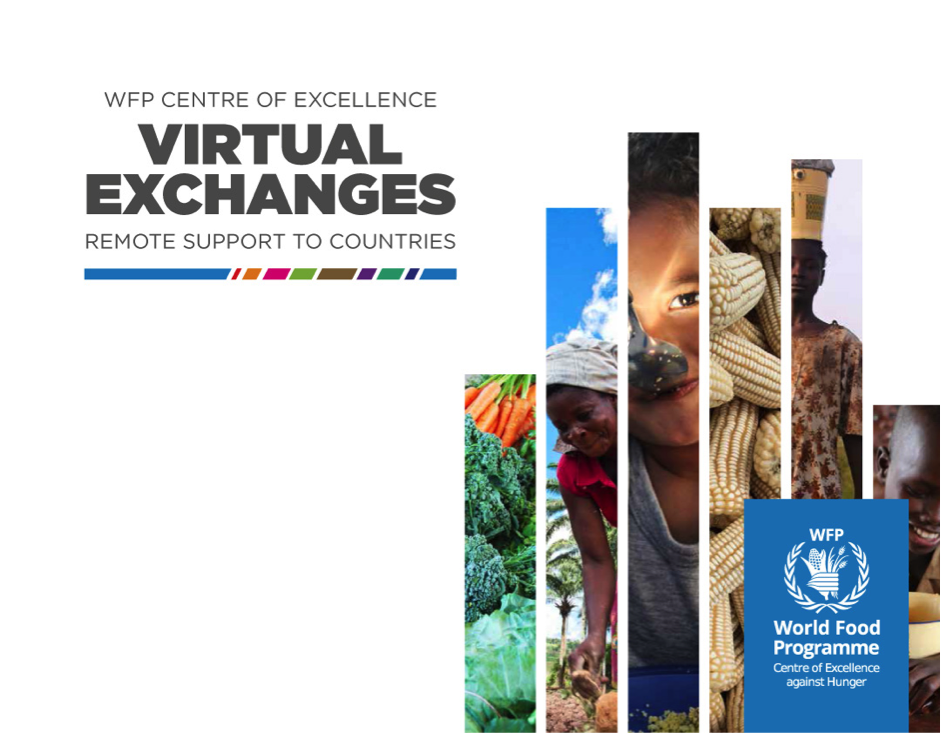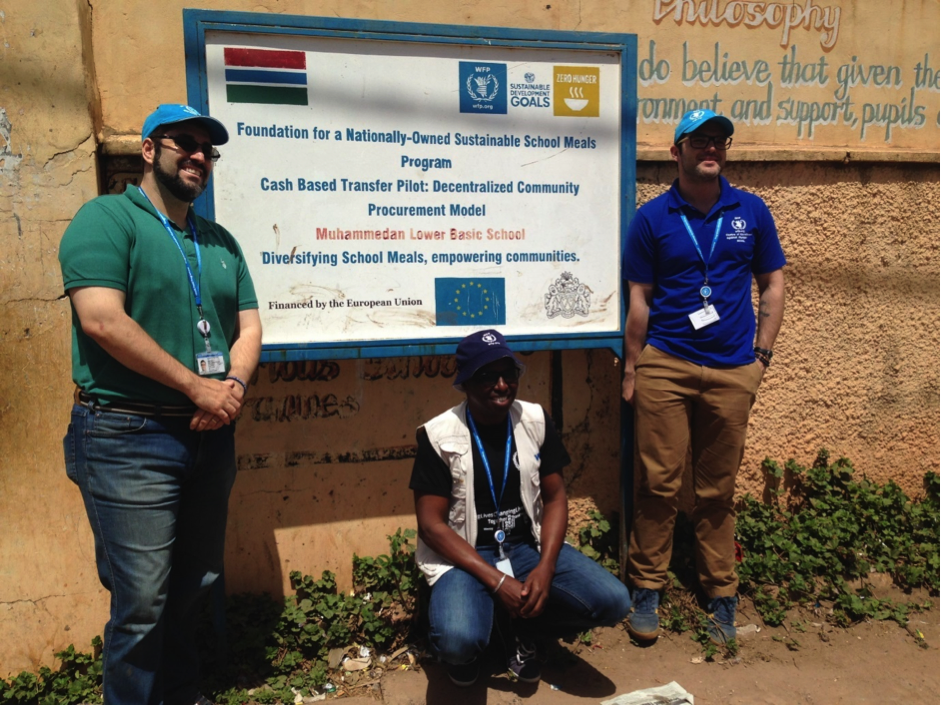
The socio-economic impacts of COVID-19 threaten to cause setbacks in the global developmental gains of the recent decades. Many of the advancements made possible by South-South and Triangular Cooperation (SSTC) are now at stake. Rapid adaptation and the implementation of new methodologies are ever more important in this context. Remote assistance has the power to use digital information and reduce costs, supporting new ways to overcome physical limitations caused by the pandemic and to create a stable and cost-effective environment for post-crisis planning. Regions such as West and Central Africa and South and Southeast Asia, where WFP Centre of Excellence (CoE) Brazil has been acting as a venue for policy dialogue and a hub for knowledge exchange for school feeding and smallholder farming, are facing severe threats to the development of their programmes.
West and Central Africa, where the WFP CoE Brazil holds an important partnership with the WFP Regional Bureau in Dakar (RBD) and several WFP country offices, are examples of this. These regions has seen many low-income countries advance on the broader school feeding policy goals from a general lower-development background to an emerging-level status in the last ten years, with some countries fully managing programmes following a handover from WFP. Yet, the combined efforts of governments and the WFP covered just a fraction of the region’s 60 million primary school-aged children population. This shows how great the potential in the region is and at the same time the size of the challenge ahead.
Adapting to new challenges
During recent months, the WFP CoE Brazil’s team – as well as other United Nations teams around the world – adapted to the restrictions imposed by the COVID-19 pandemic while all non-emergency deployment to the field remains postponed. This could have resulted in tremendous setbacks and political losses for the development made so far. However, the WFP CoE Brazil had already started to adopt digital transformations and remote assistance methodologies to support countries three years ago. With new travel restrictions, the team has expanded these tools so what had been previously started in person can continue to take place remotely.
To foster the sustainability of SSTC in supporting the scale-up of national school feeding programmes, WFP CoE Brazil has been piloting a new remote assistance model with Nepal and The Gambia. The collaboration with the WFP Country Office in Nepal started in 2017 with the development of assessments, planning and technical frameworks necessary to scale up the national school meal pilot programme.
With The Gambia, the joint work started in 2019. It includes linking the country’s school feeding programme with the national agriculture sector and applying for international funds to finance food production and market access for smallholder farmers. Experiences from both countries have helped to transform the remote assistance provided by the WFP CoE Brazil into a broader assistance package called Virtual Exchanges.
The Virtual Exchanges methodology: supporting The Gambia
The Virtual Exchanges platform is being expanded to offer more resources and tools to countries embarking on their school feeding journey.
Virtual Exchanges offers remote assistance that supports the design, implementation and delivery of a high-quality school feeding programme and facilitates field operations under country strategic plans. This methodology is based on data-informed and knowledge-based remote assistance that draws on the role and experience of WFP CoE Brazil as a knowledge hub. This approach defines needs and designs packages for remote technical support and the delivery of outputs. The exchange may involve sharing knowledge through publications; conference calls; reviews of relevant documents; country-specific webinars; capacity-building trainings and videos; remote participation in missions, events, workshops and seminars; and in-person events, if there is a specific demand and available funds.
Between 2019 and early 2020, WFP CoE Brazil supported the WFP Country Office in The Gambia to participate in some of the Virtual Exchanges. Both WFP offices and the Government of The Gambia have supported the Home-Grown School Feeding Multisector Working Group, which seeks to scale up the connection between the agriculture sector and existing school feeding programme models in the country. In a mix of in-person assistance and remote support, WFP Brazil and the WFP Country Office have also saved thousands of US Dollars in consultancy fees and traveling. In early 2020, this joint-action granted US$16 million to finance capacity-building and develop smallholder farming through South-South cooperation with a gender-sensitive approach. In the Gambian case, air travel is still necessary; however, there has already been a significant reduction in physical deployment, given the scale of the project.
Support to the WFP Regional Bureau in Dakar
More recently, one of the face-to-face South-South and Triangular Cooperation initiatives directly affected by new restrictions is the support provided to the Dakar bureau in developing regional plans and strategies for programmes in schools. “Overall, the office is fulfilling quite well its core function of technical support, oversight and strategic/policy guidance to country offices in the region. One example is the engagement with WFP Centre of Excellence in Brazil: two colleagues were supposed to come on a mission to help the regional bureau to provide strategic support, but their mission was cancelled at the last minute due to COVID-19 travel restrictions”, said in March 2020 Abdi Farah, the Regional School Feeding Advisor at the Regional Bureau in Dakar.

Experts from the Centre of Excellence met in 2019 for an assessment mission to Banjul, The Gambia. From left to right: Igor Carneiro (Centre of Excellence Brazil), Abdi Farah (regional office in Dakar) and Bruno Magalhães (Centre of Excellence Brazil) on a visit to a pilot school part of the school feeding programme in the region.
The support provided to RBD office is part of the development and implementation of the World Food Programme Global School Feeding Strategy 2020-2030, which is divided into two phases. The first phase, between March and August 2020, included the development of a concept note for planning the regional implementation of the Global School Feeding Strategy. For this first stage, several regional activities were initially planned to be carried out in Senegal, including a workshop for data collection with the presence of partners. The second stage, which will run from August to December 2020, consists of designing a participatory process for the office’s School Feeding Strategy and complementary country and partnership notes.
Indonesia
The latest example of virtual South-South cooperation in times of COVID-19 comes from Indonesia. The WFP Country Office and the Centre of Excellence had been working for several months on the development of a school feeding framework in the country when COVID-19 hit. Since then, the country office kept regular contact with Brazil to seek programme continuity. As of June 2020, and after two months of partial lockdown, Indonesia has started implementing a new strategy for school-based programmes planning and the reopening of schools. For this process, they have invited WFP CoE Brazil to support them through South-South cooperation. With the support of a dedicated COVID-19 fund from WFP HQ, the Virtual Exchanges started and might culminate in in-person meetings when the situation allows.
For more information on the cases and on the Virtual Exchanges, please contact [email protected]
If you are from a country team and would like to understand how we can support you, please fill out our contact form here.




